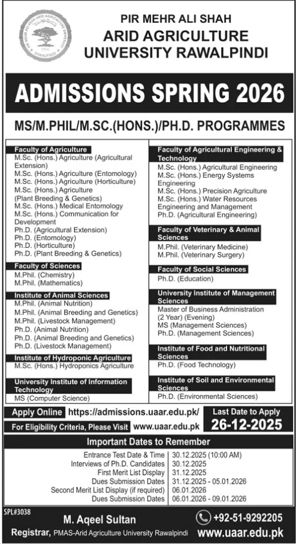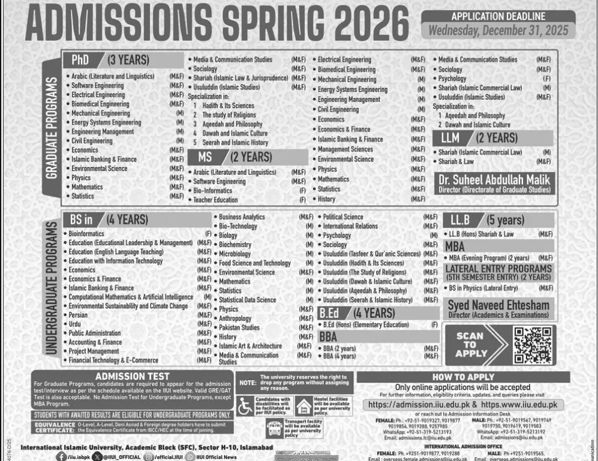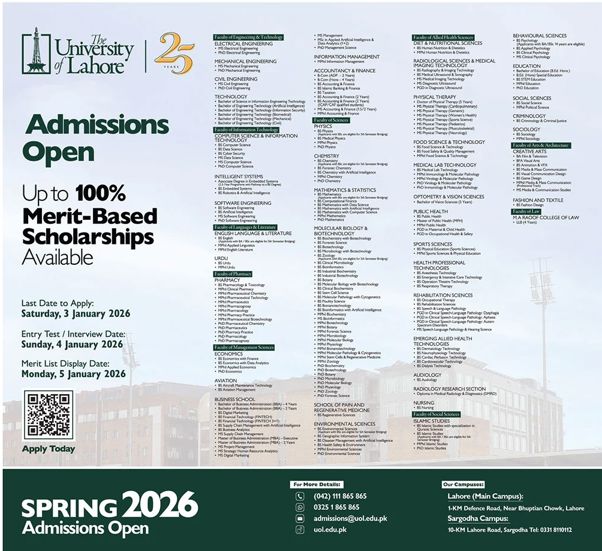MS Botany Admission Highlights
Admission Process
The admission process for a master’s degree has various requirements. All candidates are required to fulfill the form with their general personal information and educational records. The admission forms can be approached from the official websites of the university the candidate is looking for. The application forms must be completed within the due dates to proceed with admission. The admission process includes an entry test as well.
Admissions in different Institutes for MS Botany
| Date Posted | Last Date | Institute Name | Program Name | Admission Image |
|---|---|---|---|---|
| 06-Jan-2026 | 09-Jan-2026 |
 University of Education Township Lahore
University of Education Township Lahore
|
|

|
| 01-Jan-2026 | N/A |
 Superior University
Superior University
|
|

|
| 21-Dec-2025 | 22-Jan-2026 |
 Government College Women University Sialkot
Government College Women University Sialkot
|
|

|
| 18-Dec-2025 | 31-Dec-2025 |
 International Islamic University IIU Islamabad
International Islamic University IIU Islamabad
|
|

|
| 15-Dec-2025 | 17-Dec-2025 |
 Comsats Institute Of Information Technology Islamabad
Comsats Institute Of Information Technology Islamabad
|
|

|
| 09-Dec-2025 | 10-Dec-2025 |
 University of the Punjab Gujranwala (PU Gujranwala)
University of the Punjab Gujranwala (PU Gujranwala)
|
|

|
| 07-Dec-2025 | 03-Jan-2026 |
 The University of Lahore
The University of Lahore
|
|

|
| 26-Nov-2025 | 11-Dec-2025 |
 Government College University Gcu Lahore
Government College University Gcu Lahore
|
|

|
| 11-Nov-2025 | 21-Nov-2025 |
 Sarhad University
Sarhad University
|
|

|
| 11-Nov-2025 | 15-Nov-2025 |
 Shaheed Zulfiqar Ali Bhutto Medical University Islamabad
Shaheed Zulfiqar Ali Bhutto Medical University Islamabad
|
|

|
-
 University of Education Township Lahore Date Posted: 06-Jan-2026 Last Date: 09-Jan-2026 Program: MS Botany
University of Education Township Lahore Date Posted: 06-Jan-2026 Last Date: 09-Jan-2026 Program: MS Botany -

-
 Government College Women University Sialkot Date Posted: 21-Dec-2025 Last Date: 22-Jan-2026 Program: MS Botany
Government College Women University Sialkot Date Posted: 21-Dec-2025 Last Date: 22-Jan-2026 Program: MS Botany -
 International Islamic University IIU Islamabad Date Posted: 18-Dec-2025 Last Date: 31-Dec-2025 Program: MS Botany
International Islamic University IIU Islamabad Date Posted: 18-Dec-2025 Last Date: 31-Dec-2025 Program: MS Botany -
 Comsats Institute Of Information Technology Islamabad Date Posted: 15-Dec-2025 Last Date: 17-Dec-2025 Program: MS Botany
Comsats Institute Of Information Technology Islamabad Date Posted: 15-Dec-2025 Last Date: 17-Dec-2025 Program: MS Botany -
 University of the Punjab Gujranwala (PU Gujranwala) Date Posted: 09-Dec-2025 Last Date: 10-Dec-2025 Program: MS Botany
University of the Punjab Gujranwala (PU Gujranwala) Date Posted: 09-Dec-2025 Last Date: 10-Dec-2025 Program: MS Botany -

-
 Government College University Gcu Lahore Date Posted: 26-Nov-2025 Last Date: 11-Dec-2025 Program: MS Botany
Government College University Gcu Lahore Date Posted: 26-Nov-2025 Last Date: 11-Dec-2025 Program: MS Botany -

-
 Shaheed Zulfiqar Ali Bhutto Medical University Islamabad Date Posted: 11-Nov-2025 Last Date: 15-Nov-2025 Program: MS Botany
Shaheed Zulfiqar Ali Bhutto Medical University Islamabad Date Posted: 11-Nov-2025 Last Date: 15-Nov-2025 Program: MS Botany
Cities with Admissions in MS Botany
MS Botany University-Wise Admission Comparison in Pakistan 2026
MS Botany is a specialized postgraduate degree in Pakistan designed for students interested in plant sciences, biodiversity, ecology, plant biotechnology, and environmental conservation. A university-wise admission comparison helps applicants assess variations in curriculum depth, research orientation, and practical training across different institutions. The comparison table highlights faculty expertise, herbarium facilities, botanical gardens, research laboratories, and access to fieldwork opportunities. By reviewing admission criteria, eligibility requirements, merit calculation methods, program accreditation, and fee structures, students can make well-informed academic choices. It also shows which universities offer stronger research support, thesis supervision, and collaborations with agricultural, environmental, and research organizations. This comparison assists students in selecting MS Botany programs that align with modern plant science research and sustainable development needs in Pakistan.
| University | Duration | Credit Hours | Fee (Per Year) PKR | Admission Month | Eligibility Criteria | Specializations Offered | Scholarship Options | Entry Test |
|---|---|---|---|---|---|---|---|---|
| University of the Punjab, Lahore | 2 Years | 60 | 60,000 - 80,000 | • Fall (Aug-Sep) • Spring (Jan-Feb) |
BS/BSc (Hons) Botany, 2.5/4.0 CGPA | • Plant Systematics & Biodiversity • Plant Physiology & Biochemistry • Mycology & Plant Pathology • Paleobotany & Palynology |
Merit & Need-Based, HEC, Punjab Govt. | PU-CAT (Punjab University Admission Test) |
| Government College University (GCU), Lahore | 2 Years | 60 | 65,000 - 85,000 | • Fall (Aug-Sep) • Spring (Jan-Feb) |
BS (4 Years) Botany, 2.5/4.0 CGPA | • Plant Ecology & Conservation • Plant Biotechnology • Ethnobotany & Medicinal Plants • Phycology & Bryology |
Merit-Based, Alumni, Punjab Govt. | GCU Entry Test |
| University of Karachi | 2 Years | 60 | 35,000 - 50,000 | • Fall (Sep-Oct) • Spring (Mar-Apr) |
BS/BSc (Hons) Botany, Minimum 2nd Division | • Plant Anatomy & Embryology • Marine Botany • Phytochemistry • Environmental Botany |
Merit-Based, HEC, Sindh Govt. | KU Admission Test |
| University of Peshawar | 2 Years | 60 | 30,000 - 45,000 | • Fall (Sep) • Spring (Mar) |
BS/BSc (Hons) Botany, 2.5/4.0 CGPA | • Plant Taxonomy & Floristics • Plant Pathology • Palynology • Alpine & Cold Desert Botany |
Merit & Need-Based, HEC, KP Govt. | UoP Postgraduate Admission Test |
| University of Sindh, Jamshoro | 2 Years | 60 | 25,000 - 40,000 | • Fall (Nov-Dec) • Spring (May-Jun) |
BS/BSc (Hons) Botany, Minimum 45% Marks | • Halophytic Botany • Plant Biotechnology • Phycology • Medicinal Botany |
Merit-Based, HEC, Sindh Govt. | University of Sindh Admission Test |
| University of Agriculture, Faisalabad | 2 Years | 60 | 60,000 - 80,000 | • Fall (Sep-Oct) • Spring (Mar-Apr) |
BSc (Hons) Agri/Botany, 2.5/4.0 CGPA | • Agricultural Botany • Plant Breeding & Genetics • Plant Stress Physiology • Weed Science |
Merit-Based, HEC, Agri. Scholarships | UAF Departmental Test |
| Bahauddin Zakariya University (BZU), Multan | 2 Years | 60 | 45,000 - 65,000 | • Fall (Sep-Oct) • Spring (Mar-Apr) |
BS/BSc (4 Years) Botany, 2.0/4.0 CGPA | • Plant Ecology • Plant Pathology • Plant Tissue Culture • Phytogeography |
Merit-Based, BZU Schemes, HEC | BZU Postgraduate Test |
| Islamia University of Bahawalpur | 2 Years | 60 | 40,000 - 60,000 | • Fall (Oct-Nov) • Spring (Apr-May) |
BS (4 Years) Botany, 2.0/4.0 CGPA | • Cholistan Desert Botany • Palynology • Ethnobotany • Plant Systematics |
Merit-Based, Need-Based, IUB Schemes | IUB Admission Test |
| University of Sargodha | 2 Years | 60 | 50,000 - 70,000 | • Fall (Sep) • Spring (Mar) |
BS/BSc (Hons) Botany, 2.0/4.0 CGPA | • Medicinal & Aromatic Plants • Plant Anatomy • Plant Biotechnology • Biodiversity & Conservation |
Merit-Based, Need-Based, Punjab Govt. | UOS Admission Test |
| University of Gujrat | 2 Years | 60 | 55,000 - 75,000 | • Fall (Sep) • Spring (Mar) |
BS (4 Years) Botany, 2.0/4.0 CGPA | • Plant Physiology • Mycology • Plant Ecology • Bryology & Pteridology |
Merit Scholarships, HEC | UOG Graduate Admission Test |
| Quaid-i-Azam University, Islamabad | 2 Years | 60 | 70,000 - 90,000 | Fall (Aug-Sep) | BS (4 Years) Botany/Biology, 2.5/4.0 CGPA | • Plant Systematics & Evolution • Plant Developmental Biology • Plant-Microbe Interactions • Conservation Biology |
Merit-Based, HEC, Indigenous | QAU Departmental Test |
| Hazara University, Mansehra | 2 Years | 60 | 35,000 - 50,000 | • Fall (Sep) • Spring (Mar) |
BS/BSc (Hons) Botany, 2.0/4.0 CGPA | • Himalayan Flora • Ethnobotany • Plant Pathology • General Botany |
Merit-Based, HEC, KP Govt. | HU Entry Test |
| Abdul Wali Khan University, Mardan | 2 Years | 60 | 30,000 - 45,000 | • Fall (Sep) • Spring (Mar) |
BS/BSc (Hons) Botany, 2.0/4.0 CGPA | • Plant Ecology • Plant Physiology • Plant Pathology • Floristics |
Merit-Based, HEC, KP Govt. | AWKUM Departmental Test |
| Kohat University of Science & Technology (KUST) | 2 Years | 60 | 40,000 - 60,000 | • Fall (Sep) • Spring (Mar) |
BS/BSc (Hons) Botany, 2.5/4.0 CGPA | • Medicinal Plants • Plant Biotechnology • Mycology • Plant Anatomy |
Merit-Based, HEC | KUST Admission Test |
| University of Malakand | 2 Years | 60 | 30,000 - 45,000 | • Fall (Sep) • Spring (Mar) |
BS/BSc (Hons) Botany, 2.0/4.0 CGPA | • Plant Taxonomy • Plant Ecology • Ethnobotany • Plant Pathology |
Merit-Based, HEC | UOM Departmental Test |
| Federal Urdu University of Arts, Science & Technology (FUUAST), Karachi | 2 Years | 60 | 30,000 - 45,000 | • Fall (Aug-Sep) • Spring (Feb-Mar) |
BS/BSc (Hons) Botany, Minimum 2nd Division | • Plant Physiology • Plant Ecology • Plant Pathology • Biodiversity |
Merit-Based, HEC | FUUAST Admission Test |
| Lahore College for Women University (LCWU) | 2 Years | 60 | 55,000 - 75,000 | • Fall (Aug-Sep) • Spring (Jan-Feb) |
BS/BSc (Hons) Botany, 2.5/4.0 CGPA | • Plant Biotechnology • Medicinal Botany • Palynology • Plant Conservation |
Merit-Based, Punjab Govt., HEC | LCWU Departmental Test |
| Kinnaird College for Women, Lahore | 2 Years | 60 | 130,000 - 160,000 | Fall (Aug-Sep) | BS (4 Years) Botany, Minimum 2.5 CGPA | • Plant Sciences • Ethnobotany • Plant Ecology • Horticulture |
Merit-Based Scholarships, Alumni | Kinnaird College Admission Test |
| University of Azad Jammu & Kashmir (UAJK), Muzaffarabad | 2 Years | 60 | 40,000 - 60,000 | • Fall (Sep) • Spring (Mar) |
BS/BSc (Hons) Botany, Minimum 2nd Division | • Alpine Botany • Plant Systematics • Plant Pathology • Ethnobotany |
Merit-Based, HEC, AJK Govt. | UAJK Admission Test |
| Shah Abdul Latif University, Khairpur | 2 Years | 60 | 25,000 - 40,000 | • Fall (Nov-Dec) • Spring (May-Jun) |
BS/BSc (Hons) Botany, Minimum 45% Marks | • Desert Botany • Plant Physiology • Medicinal Plants • Plant Taxonomy |
Merit-Based, HEC, Sindh Govt. | SALU Admission Test |
| University of Balochistan, Quetta | 2 Years | 60 | 20,000 - 35,000 | • Fall (Sep) • Spring (Mar) |
BS/BSc (Hons) Botany, Minimum 2nd Division | • Arid Zone Botany • Plant Ecology • Bryology • Plant Anatomy |
Merit-Based, HEC, Balochistan Govt. | UoB Postgraduate Test |
| Sardar Bahadur Khan Women’s University, Quetta | 2 Years | 60 | 25,000 - 40,000 | • Fall (Sep) • Spring (Mar) |
BS/BSc (Hons) Botany, Minimum 2nd Division | • General Botany • Plant Taxonomy • Plant Physiology • Ethnobotany |
Merit-Based, Balochistan Govt. | SBKWU Admission Test |
| University of Swabi | 2 Years | 60 | 30,000 - 45,000 | • Fall (Sep) • Spring (Mar) |
BS/BSc (Hons) Botany, 2.0/4.0 CGPA | • Plant Sciences • Plant Biotechnology • Plant Ecology • Floristics |
Merit-Based | University of Swabi Test |
| Khushal Khan Khattak University, Karak | 2 Years | 60 | 25,000 - 40,000 | • Fall (Sep) • Spring (Mar) |
BS/BSc (Hons) Botany, 2.0/4.0 CGPA | • Plant Pathology • Medicinal Plants • Plant Physiology • General Botany |
Merit-Based | KKKU Departmental Test |
| Superior University | 1.5 - 2 Years | 60 | 120,000 - 160,000 | • Fall (Sep) • Spring (Mar) |
BS (4 Years) Botany/Biology, Minimum 2.0 CGPA | • Applied Botany • Plant Biotechnology • Environmental Botany • Horticulture |
Merit Scholarships, Corporate Scholarships | Superior University Graduate Test |
| University of Education | 2 Years | 60 | 70,000 - 90,000 | • Fall (Sep) • Spring (Mar) |
BS (4 Years) Botany, 2.5/4.0 CGPA | • Plant Sciences • Botany Education • Ethnobotany • Plant Ecology |
Merit-Based, Punjab Govt. Scholarships | UE Entry Test |
| Minhaj University | 2 Years | 60 | 100,000 - 140,000 | • Fall (Sep) • Spring (Mar) |
BS (4 Years) Botany, Minimum 2.0 CGPA | • General Botany • Medicinal Plants • Plant Pathology • Environmental Botany |
Merit-Based, Need-Based | Minhaj University Admission Test |
| Emerson University Multan | 2 Years | 60 | 60,000 - 80,000 | • Fall (Sep) • Spring (Mar) |
BS (4 Years) Botany, 2.0/4.0 CGPA | • Plant Taxonomy • Plant Physiology • Ethnobotany • Plant Biotechnology |
Merit-Based, University Scholarships | Emerson University Admission Test |
Eligibility Criteria
The candidate must have 4 years of bachelor's degree in botany or an equivalent degree in a relevant discipline with a minimum of 2.00 CGPA or 50% in the annual system.
Admission Intake
The admission opportunity occurs twice a year at most universities. The spring and fall intake occurs during March and September respectively.
Entry Test
Every University has its own admission criteria. There are various types of entry tests for postgraduate admissions:
GAT- Graduate Assessment Test:
The Graduate Assessment Test (GAT) is required for admission to MS/M.Phil. courses. The exam is divided into several sections that include analytical assessment, logical, research-based, and field-related questions. The test is further divided into sections based on the type of degree.
University Test:
For admission to MS Botany programs, most universities consider MCAT/NTS tests. Students who have not taken any of the graduate tests are then required to take the specific university test. The exam typically includes logical, analytical, and field-related questions. Some universities only consider their admissions test, whereas others accept a general assessment test.
Merit Lists
Every university publishes its merit list when the admissions process ends. The merit is determined by past academic records, an entry test, and an interview conducted at the time of admission (if required). Depending on the number of seats available at a given university, different merit lists may exist.
Fee Structure
Several universities have different fee structures. The private sector charges a higher fee than the public sector, which is usually divided into quarterly installments at most universities.
Colleges & Universities in Pakistan for MS Botany
Some HEC recognized universities offering MS Botany are:
- Lahore College for Women University
- University of Punjab
- University of Kotli Azad Jammu and Kashmir
Public Sector
Lahore College for Women University
To enroll for an MS in Botany a candidate must have a bachelor’s degree in botany or equivalent and obtain 2.5/4.00 CGPA in a semester or 50% marks in the annual system. The entry test is mandatory for every candidate. The qualifying mark for the entry test is a minimum of 50%. The interview session is also conducted by the university. Lahore College offers MS Botany regularly and on self-support as well.
University of Punjab
The University of Punjab provides admission solely based on merit criteria. To seek admission in MS Botany a student must possess a minimum of 50% marks in BS Botany or equivalent. The program is being offered as morning and self-support.
Frequently Asked Questions:
Q: What are the eligibility criteria for MS Botany Admission 2026?
A: Candidates must hold a 16-year education (BS or MSc) in Botany or related biological sciences with a minimum of 2.5 CGPA or 60% marks, and pass the university’s entry test or GAT (General).
Q: When do MS Botany admissions start in Pakistan for 2026?
A: Most universities open admissions for MS Botany between May and September 2026, depending on their academic schedules.
Q: Which universities are offering MS Botany admissions in Pakistan?
A: Leading universities include Punjab University Lahore, Quaid-e-Azam University Islamabad, University of Karachi, GCU Lahore, and Islamia University Bahawalpur.
Q: What documents are required for MS Botany admission?
A: Applicants need attested academic transcripts, CNIC, passport-size photos, NOC (if employed), research proposal (if required), and valid GAT or university entry test results.



.jpg)









Share your comments & questions here
No comments yet. Be the first to comment!